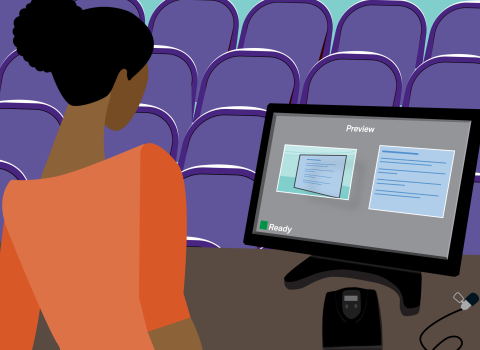Northwestern is deeply committed to integrating the University’s teaching mission throughout the academic experience for faculty and students—in-person, online, and every variation in-between. We are continually working to facilitate and coordinate efforts across the University to provide an optimal environment in which innovative practices in teaching, pedagogy, and student assessment of learning are encouraged to thrive.
Instructor Resources
Teaching online or in a blended format? Review the pages linked below for content designed to provide you with the tools and resources to succeed.
Best Practices for Online Teaching
This resource guide is intended for instructors who are planning to develop a new online course or migrate an existing course from the face-to-face to an online or blended format.
Canvas Resource Hub
Teaching and Learning Technologies offers a number of opportunities to complement and extend the capabilities of your Canvas courses with supported apps and digital tools.
Canvas Learning Center
Visit the Canvas Learning Center for key information and tools that will make managing your courses in Canvas successful.
Assessment
This site's purpose is to provide Northwestern faculty and staff with useful resources for their own assessments of student learning and to inform the community about assessment efforts at Northwestern.
MOOCs
A variety of free online courses are offered by Northwestern which can be taken anywhere in the world at any time. Northwestern students, alumni, instructors, and staff: please follow these special instructions to enroll and receive the full course experience free in any of the courses or specializations listed below.
VIEW AVAILABLE COURSES
Degree Programs
Many schools at Northwestern have developed their own modules and courses to offer students a variety of distance learning opportunities to earn a degree. A blended or hybrid program is defined as having a mixture of required online and face-to-face (in-person) components, while fully online programs can be offered as either synchronous or asynchronous, but all of the course materials are delivered online with no requirement for specific, location-based activities. The variety of course formats currently offered include:
- Online asynchronous: Course is online and does not require synchronous attendance
- Online synchronous: Course is online and requires synchronous attendance at some or all sessions
- Hybrid majority online: Course has a number of online components as well as required in-person components
- Hybrid majority in-person: Course has a number of in-person, face-to-face meetings as well as required online components
- Face-to-face: Course is in-person, face-to-face and may include technological aids and supplements, such as online homework problems
Find a list of the currently available programs open for enrollment via the button below. Admission into Northwestern is required.*
View Available Programs
*International Students: Northwestern University strives to provide access to its online degree programs to all students. While we will do our best to provide access, students must be aware that they may not be able to access course material due to technology or internet limitations. To that end, students are advised that they must meet the following technology requirements:
- Students are required to have a laptop that meets or exceeds university requirements, with a working webcam and microphone for synchronous sessions.
- Students are required to have access to a reliable, high-speed internet connection of at least 5 Mbps. While students can connect via Wi-Fi, we highly recommend using a wired internet connection, as faster internet connections improve the online experience.
Course materials are hosted primarily in the learning management system (Canvas), but occasionally courses may link to external content. Any costs associated with procuring access will be borne by the individual student.
In addition, it is a student’s responsibility to understand requirements related to whether an online degree will be recognized in a country other than the United States, how the collection of student data may be used in another country, and whether withholding taxes (in addition to the price of tuition) will apply. Some countries may not formally recognize foreign online degrees, which may have implications for students who later seek to enroll in other educational programs, or for those who seek employment with that country’s government or other employers requiring specific credentials.












